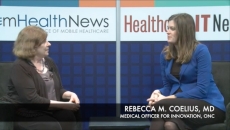Interoperability
"In 2003, fewer than 5 percent of hospitals in the U.S. had any form of electronic records," said David Brailer, MD, who became the nation's first "heath information czar" in 2004. "A smaller percentage of doctors' offices had them, probably less than 1 percent. It was something everyone knew was inevitable, but the fire had not been lit," he tells Healthcare IT News.
Rebecca Coelius, MD, ONC's Medical Officer for Innovations, talks with Bernie Monegain about how ONC defines innovation and is driving advancements in areas such as Blue Button and standards of interoperability.
HIMSS is working with the U.S. Department of Health and Human Services, through HHS' Innovator in Residence program, to develop a strategy for nationwide patient data matching.
Google users may have come across the protected health information of nearly 33,000 individuals over the last two months, after a health system's security gaffe left patient data exposed online.
There's one word that can aptly describe the mobile health market in its entirety. Nascent. And it's been lingering in this stage for years, said industry officials at the 2013 mHealth Summit this week. So, what's finally going to move the market forward? For many, it involves taking a little closer look at history.
In the wake of HealthCare.gov's botched launch, analysts -- and Congressional leaders -- contend the private sector would have done it better. That's not necessarily so, says Karen Evans, who offers five tips for successful rollouts.
It's an ironic story. The Office for Civil Rights, the division of HHS responsible for investigating HIPAA privacy and security violations, is now facing scrutiny after its own security practices failed to meet federal requirements.
In opening its new, flagship hospital in the state capital last month, MaineGeneral Medical Center took a bit of a gamble promoting the $312 million Alfond Center for Health on Facebook.
The healthcare industry depends on data, so unplanned data center outages can be a real downer. How much so? Well, in addition to the expected consequences of business and care disruption, there's also the financial cost incurred due to system outages. And it's no small number.
Data breaches and cybersecurity threats in healthcare are going to happen. It's virtually unavoidable. What can be avoidable, however, are the messy consequences of substandard risk assessment strategies and inadequate threat response.
